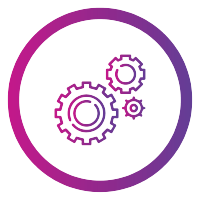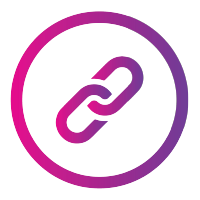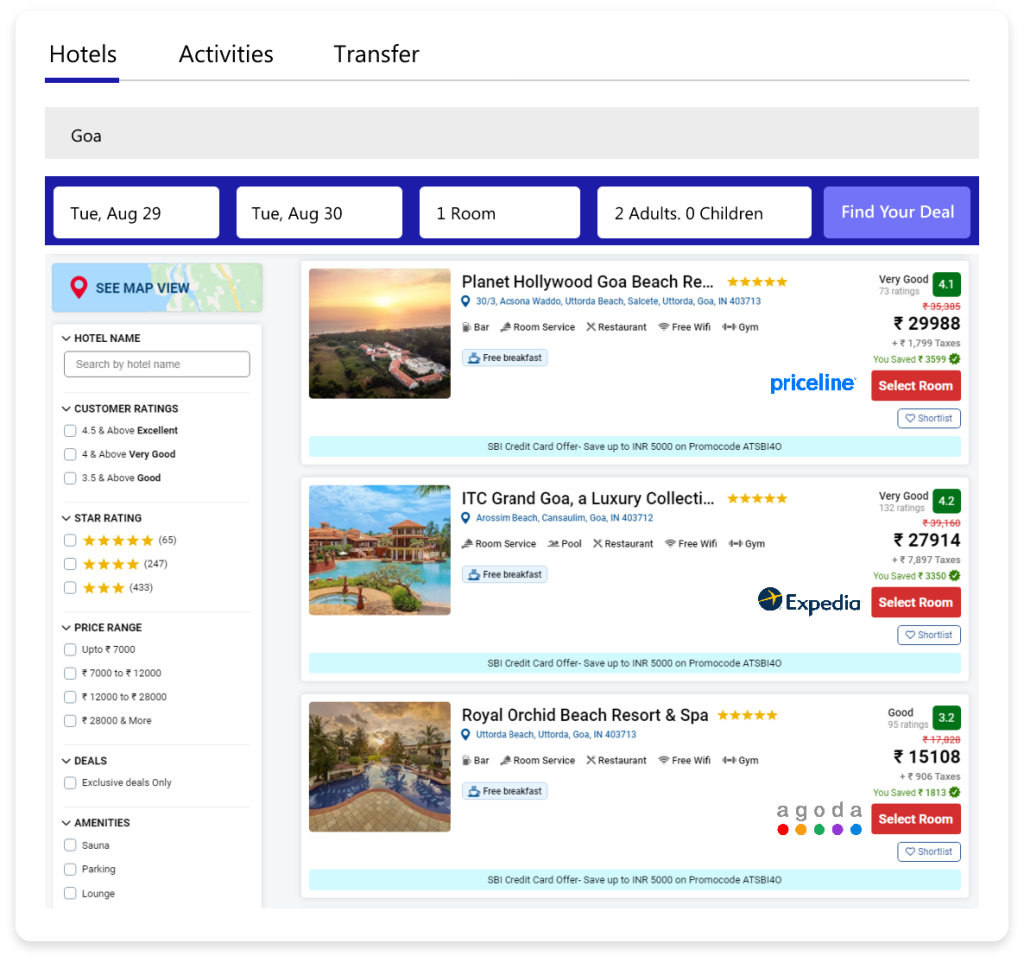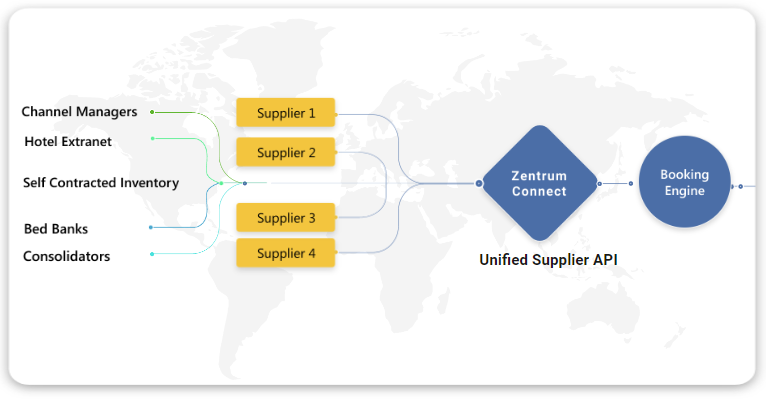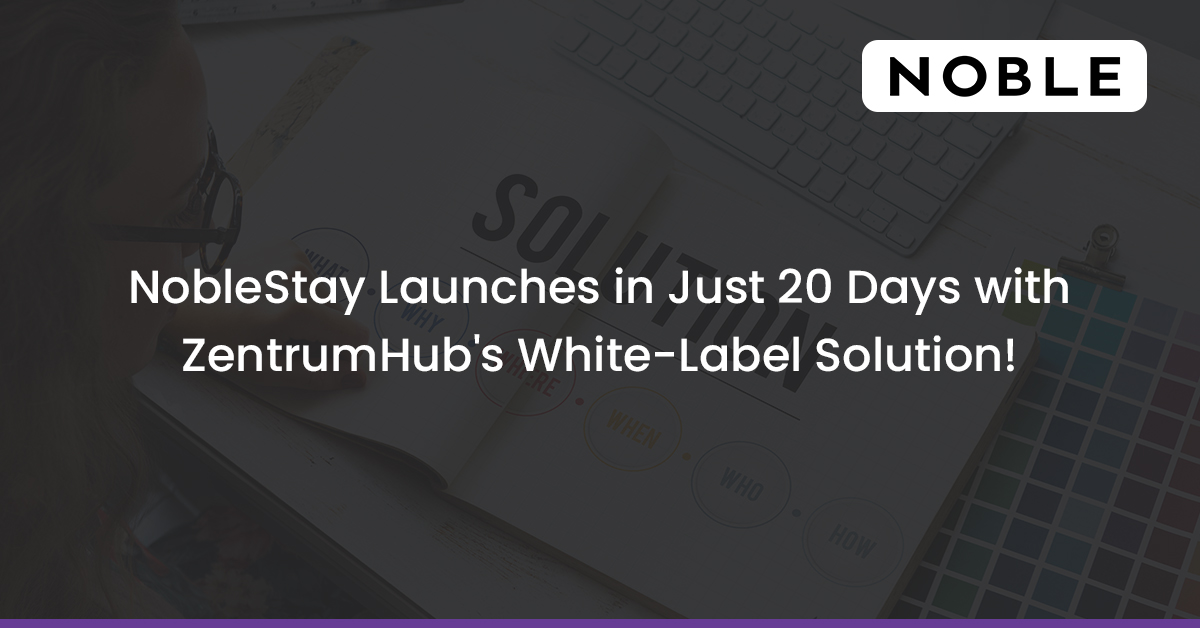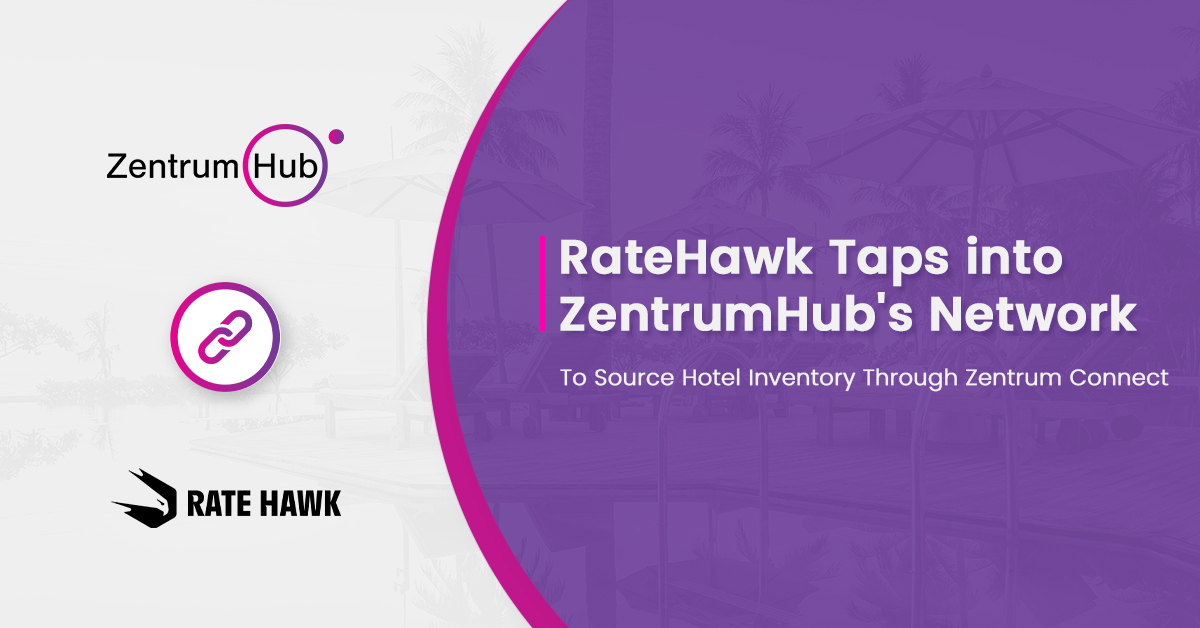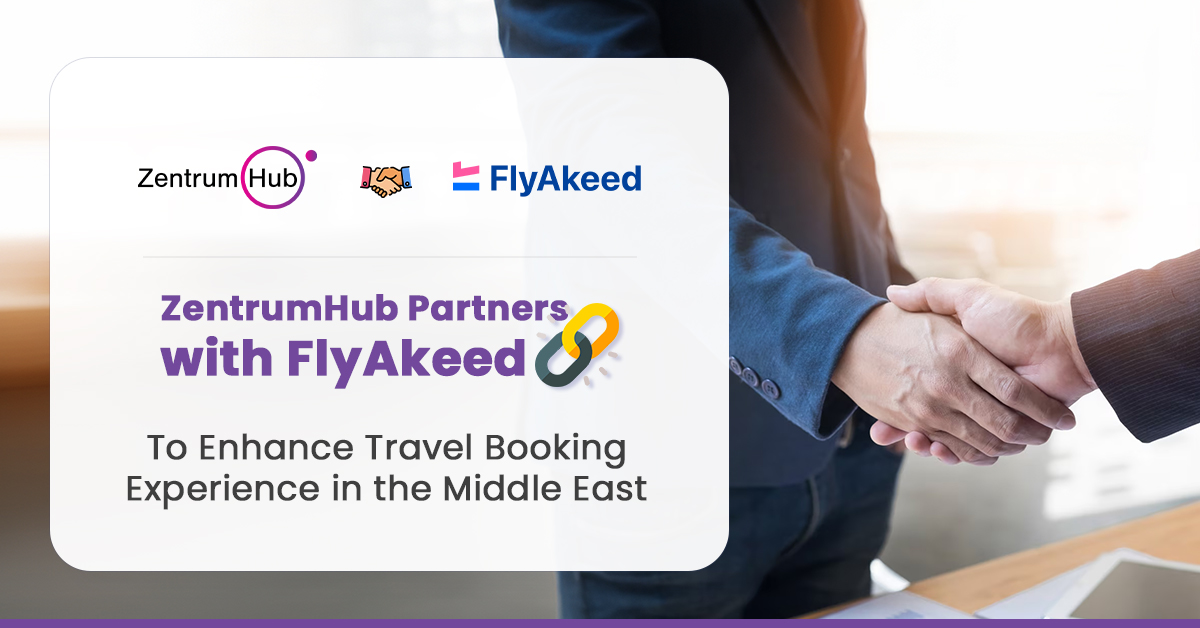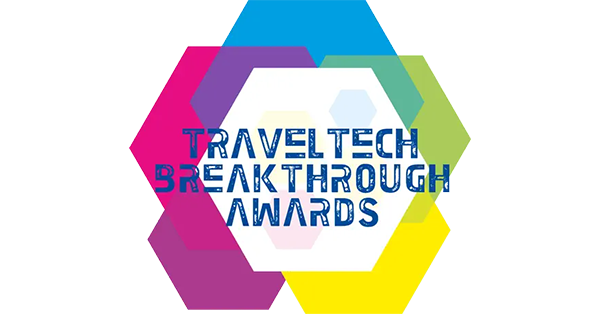Benefits of Travel Agency Software
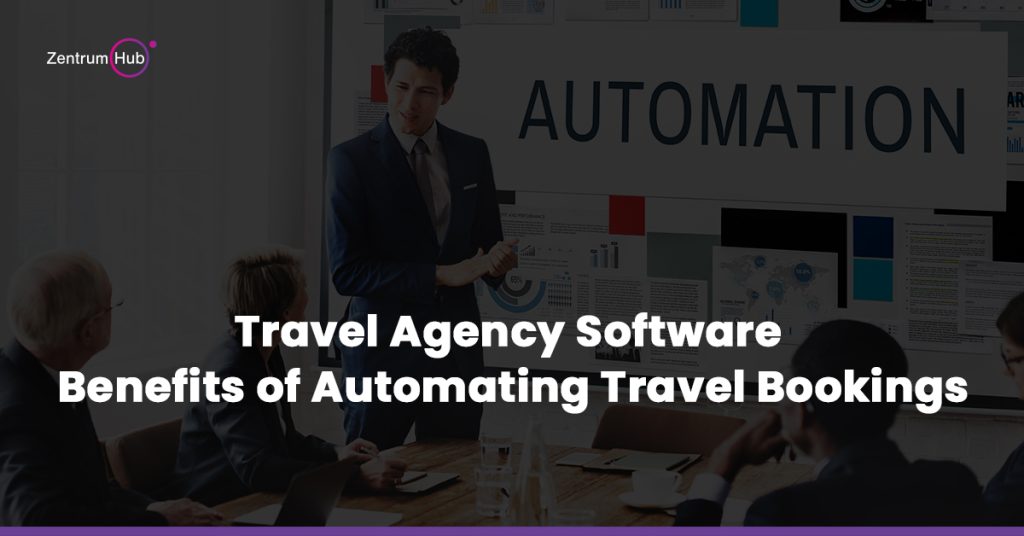
In an era defined by digital convenience, automation has become a cornerstone of successful businesses, particularly in the travel industry. Travel agencies today face increasing competition and heightened customer expectations for seamless, personalized experiences. To meet these demands, automating travel bookings and customer management is not just a luxury—it’s a necessity. This blog explores the myriad benefits of leveraging travel agency software to automate key operations, driving efficiency, customer satisfaction, and profitability. 1.Streamlined Booking Processes The manual process of booking travel—coordinating flights, accommodations, car rentals, and activities—is complex and prone to errors. Automation eliminates these inefficiencies by enabling: a) Faster and Accurate Bookings With automated systems, agents can instantly search and compare thousands of options across suppliers, ensuring the best deals for clients. Booking confirmations, tickets, and itineraries are generated automatically, reducing the risk of errors and saving valuable time. b) 24/7 Booking Capabilities Automation enables customers to book services online at any time, breaking the constraints of traditional business hours. Self-service portals empower clients to explore and reserve trips, while agencies continue to earn revenue around the clock. c) Real-Time Availability Integrated systems provide live updates on flight availability, hotel rooms, and tour packages. This minimizes instances of overbooking and ensures up-to-date inventory information for both agents and clients. Also Read Why OTA Needs Travel Agency Software? 2.Enhanced Customer Management Customer satisfaction is the backbone of a thriving travel agency. Automated customer relationship management (CRM) tools within travel agency software help businesses build strong relationships by: a) Personalization at Scale Automation collects and analyzes customer data, enabling agencies to tailor recommendations based on preferences, past bookings, and budgets. Personalized email campaigns or itinerary suggestions make clients feel valued, enhancing loyalty. b) Centralized Customer Profiles All customer interactions, including inquiries, bookings, and feedback, are stored in a single database. This holistic view allows agents to provide consistent and informed service, even across multiple touchpoints. c) Proactive Communication Automated alerts and notifications keep customers informed about booking confirmations, schedule changes, or upcoming payments. Proactive communication reduces confusion and improves the overall experience. 3.Increased Operational Efficiency Efficiency is key to managing costs and staying competitive. Automation streamlines day-to-day operations by: a) Reducing Administrative Tasks Repetitive tasks like data entry, generating invoices, or manually updating booking details consume significant time. Automation handles these tasks, allowing agents to focus on higher-value activities like crafting unique travel experiences or upselling premium packages. b) Faster Problem Resolution Automated workflows flag issues like payment failures or booking conflicts immediately, enabling quick resolution. Many systems also include integrated customer support tools, such as chatbots, that provide instant assistance for common queries. c) Scalability As your business grows, automation ensures that increased bookings or customer inquiries don’t overwhelm your team. Scalable systems can handle larger volumes of data and transactions with ease. 4.Cost Savings and Revenue Growth By eliminating inefficiencies, automation helps travel agencies reduce costs while simultaneously boosting revenue. a) Lower Overheads Automated systems reduce the need for manual labor in administrative tasks, allowing agencies to operate with leaner teams. This translates to significant savings on salaries and training. b) Minimized Errors Mistakes in bookings or billing can be costly, both financially and reputationally. Automation ensures accuracy, reducing the risk of expensive errors or dissatisfied customers. c) Upselling and Cross-Selling Opportunities Automated systems analyze customer behavior and purchasing patterns, recommending relevant upgrades or additional services. For example, a customer booking a flight might be offered discounted hotel stays or travel insurance, increasing average revenue per booking. Also Read: Travel Agency Software – Challenges & Solutions 5.Improved Data Analytics and Decision-Making Automation unlocks the power of data, offering insights that drive smarter business decisions. a) Real-Time Analytics Travel agency software provides real-time dashboards showing key metrics like booking trends, customer demographics, and revenue streams. This helps agencies identify popular destinations, peak seasons, and areas for improvement. b) Forecasting and Planning Predictive analytics tools analyze historical data to forecast demand, optimize pricing strategies, and plan inventory. Agencies can make data-driven decisions to maximize profits and customer satisfaction. c) Enhanced Marketing Strategies By understanding customer behavior, agencies can create targeted marketing campaigns. For example, promoting luxury tours to frequent high-spenders or offering last-minute deals to budget travelers. 6.Superior Customer Experience In the competitive travel market, a seamless customer experience is a critical differentiator. Automation plays a pivotal role by: a) Offering Convenience Online booking platforms, mobile apps, and automated itineraries make travel planning effortless for customers. Self-service options empower them to customize their trips at their own pace. b) Providing Transparency Automated tools give clients visibility into pricing, availability, and booking policies. Clear information builds trust and reduces the likelihood of disputes. c) Ensuring Consistency Standardized workflows ensure that every customer receives consistent service quality, regardless of the agent or platform they interact with. 7. How Secure is the Hotel API for Managing Bookings and Transactions? Security is a top priority for any OTA handling customer data and transactions. Hotel APIs are designed with robust security protocols to protect sensitive information, such as personal details and payment data. Here’s how they ensure security: Data Encryption This ensures that sensitive information, such as customer names and credit card details, is encrypted during transmission. Authentication APIs use authentication methods such as API keys, OAuth tokens, and IP whitelisting to ensure that only authorized users can access the system. This prevents unauthorized access to the booking system. PCI Compliance If your OTA handles payment data, it must comply with Payment Card Industry Data Security Standards (PCI DSS). Hotel APIs are often PCI-compliant, ensuring that payment data is processed securely. Fraud Detection Some hotel APIs offer built-in fraud detection tools that monitor suspicious booking behavior or flag potential fraud, adding an extra layer of security. 8. Competitive Advantage Adopting automation gives travel agencies a significant edge in an increasingly digital market. a) Meeting Modern Expectations Today’s travelers expect fast, efficient, and digital-first experiences. Automation helps agencies meet these expectations, positioning themselves as innovative and customer-centric. b) Standing Out in the Market Smaller agencies
Major Challenges in Travel API Integration
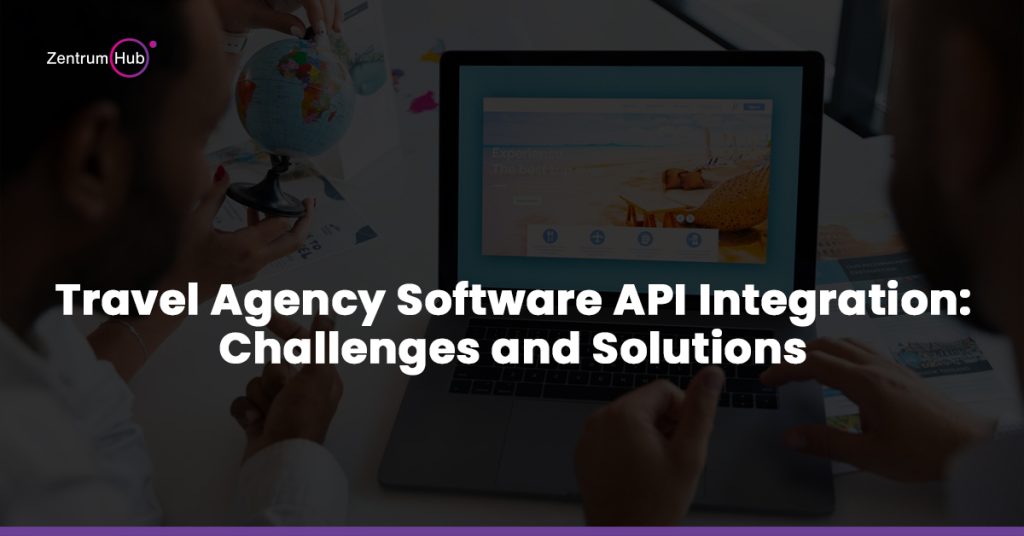
Challenges Faced by OTA during API Integration APIs allow travel agencies to connect with various suppliers, such as airlines, hotels, and car rental services, to provide real-time availability, pricing, and booking functionality. While the benefits are undeniable, implementing API integrations comes with its own set of challenges. For example, a travel agency software integrated with travel APIs can access real-time travel schedules, seat availability, and fare details from various airlines. Similarly, hotel APIs provide room availability, rates, and booking options. APIs play a vital role in automating workflows, reducing manual processes, and offering customers seamless booking experiences. With APIs, travel agencies can aggregate services from multiple vendors into one interface, enhancing efficiency and customer satisfaction. Benefits of Travel Agency Software API Integration Before diving into the challenges, it’s important to understand the key advantages of travel API integration: Real-Time Access: APIs provide real-time data for travels, hotels, and other travel services, ensuring up-to-date inventory and pricing. Expanded Inventory: By integrating multiple APIs, agencies can offer a wider range of services from various suppliers. Customization: Travel agency software can use APIs to create tailor-made travel packages by combining travels, accommodations, and tours. Cost Efficiency: Automation reduces the need for manual interventions, saving time and operational costs. Improved User Experience: APIs enable smooth booking experiences for customers, with features like dynamic pricing and instant confirmations. Challenges in Travel Agency Software API Integration Despite the benefits, travel API integration poses several challenges that can hinder its successful implementation: Data Consistency and Accuracy APIs rely on suppliers to provide accurate and consistent data. Discrepancies in pricing, availability, or booking details can lead to errors, resulting in customer dissatisfaction. Example: A travel API might show seats as available during the booking process but display an error at the payment stage due to outdated inventory. Latency Issues High latency during API calls can slow down response times, causing delays in displaying results to customers. This is especially problematic during peak travel seasons or when multiple users are accessing the system simultaneously. Example: If hotel search results take too long to load, customers may abandon the booking process. Complexity in Integration Integrating multiple APIs from different suppliers can be technically complex. Each API has its own structure, protocols, and data formats, requiring significant customization and development efforts. Example: Travel APIs and car rental APIs often use different naming conventions and data schemas, making it challenging to unify them into one system. Dependency on Third-Party Providers Travel agencies are highly dependent on API providers for maintaining data accuracy, uptime, and overall performance. Downtime or errors on the provider’s end can directly impact the agency’s operations. Example: If an airline’s API goes offline, the agency may not be able to process bookings, leading to lost revenue. Costs and Licensing API providers often charge licensing fees or commission-based charges, which can add up, especially when integrating multiple APIs. Agencies must carefully manage these costs to maintain profitability. Example: Popular APIs like Amadeus or Sabre often come with significant licensing fees, impacting small travel agencies’ budgets. Security Concerns APIs handle sensitive customer information, such as payment details and personal data. Any vulnerabilities in API integration can expose this data to security threats like hacking or unauthorized access. Example: An insecure API connection could lead to a data breach, compromising customer trust and agency reputation. Scalability and Maintenance As the business grows, agencies need their software to scale and handle increased traffic and API requests. Maintaining API integrations, especially when providers update their systems, can be resource-intensive. Example: A travel agency expanding its operations may face challenges in scaling its API infrastructure to handle higher volumes of transactions. Solutions to Overcome Travel Agency Software API Integration Challenges For successful API integration, travel agencies need strategic planning and the right tools. Here are practical solutions to address the challenges mentioned above: Implement a Middleware Layer A middleware layer acts as a bridge between the travel agency software and multiple APIs. It standardizes data formats, protocols, and workflows, making integration easier and more efficient. Benefits: Reduces complexity in managing multiple APIs. Provides a centralized platform for monitoring and troubleshooting API issues. Example: A middleware solution can unify travel, hotel, and car rental APIs into a single interface for the travel agency software. Optimize API Performance Use caching mechanisms and load balancing to reduce latency and improve response times. Caching stores frequently accessed data, such as popular travel routes or hotel availability, reducing the need for repeated API calls. Benefits: Faster response times for users. Reduces the load on API servers during peak traffic. Example: Implementing a caching solution for frequently searched destinations during the holiday season can enhance user experience. Choose Reliable API Providers Partner with reputable API providers known for their reliability, uptime, and support services. Perform due diligence by checking reviews, uptime statistics, and available support channels. Benefits: Ensures consistent data accuracy and performance. Reduces dependency risks associated with unreliable providers. Example: Providers like Sabre, Amadeus, and Expedia Partner Solutions offer robust and well-documented APIs. Monitor and Test Regularly Implement monitoring tools to track API performance, uptime, and error rates. Regular testing helps identify potential issues and ensures seamless integration. Benefits: Detects and resolves issues proactively. Improves overall system stability. Example: Use tools like Postman or API monitoring services to test endpoints and measure response times. Prioritize Security Measures Secure API connections with encryption protocols like HTTPS and use authentication mechanisms such as OAuth 2.0 to protect sensitive data. Conduct regular security audits to identify and fix vulnerabilities. Benefits: Protects customer data and builds trust. Reduces the risk of cyber threats. Example: Ensure that payment gateways integrated via APIs comply with PCI DSS (Payment Card Industry Data Security Standard). Manage Costs Effectively Negotiate pricing with API providers and evaluate usage-based models to optimize costs. Consider using free or lower-cost APIs for less critical services. Benefits: Keeps operational costs under control. Allows for more sustainable scaling of services. Example: Use a combination of premium APIs for core services and open-source
Integrating Payment Systems into Your Travel Agency Software
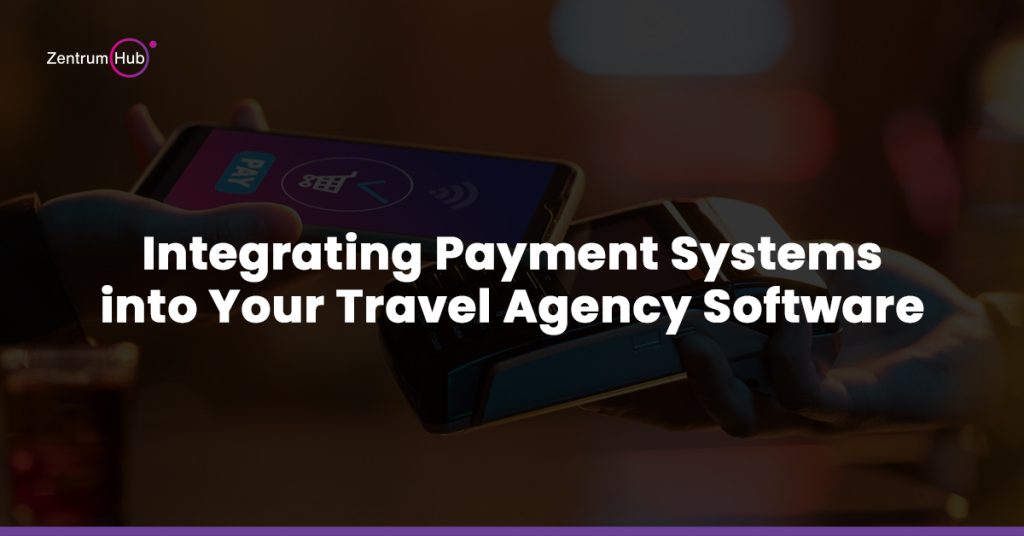
Integrating Payment Systems into Your Travel Agency Software The travel industry thrives on customer convenience and satisfaction. An integral part of that is ensuring that customers have a frictionless way to pay for services. Integrating a robust payment system into your travel agency’s software can transform your operations, making transactions faster, more secure, and capable of accommodating diverse payment methods. In the fast-paced world of travel, seamless and secure payment processes are critical for an exceptional customer experience. Integrating a payment system into your travel agency software ensures smooth transactions, enhances trust, and fosters customer loyalty. This comprehensive guide will explore the benefits, challenges, and best practices for effectively integrating payment systems. Benefits of Payment System Integration a. Improved Customer Experience A streamlined payment process is fundamental to customer satisfaction. The ability to quickly complete a transaction means fewer cart abandonments and higher conversion rates. For instance, a study by the Baymard Institute found that nearly 18% of shoppers abandon their carts due to a long or complicated checkout process. A seamless integration reduces these friction points. b. Enhanced Security and Compliance Integrating a trusted payment system comes with built-in security protocols such as tokenization and encryption, which protect sensitive data. Compliance with global standards like PCI DSS (Payment Card Industry Data Security Standard) ensures that your agency operates within legal requirements, safeguarding both you and your customers. c. Expanded Payment Options Offering various payment methods, such as credit cards, e-wallets, bank transfers, and even cryptocurrencies, appeals to a global audience. This is especially important for travel agencies, as clients often come from different parts of the world with varying payment preferences. Statistic: According to Worldpay’s Global Payments Report, over 40% of global online transactions are made via digital wallets. Types of Payment Systems a. Payment Gateways vs. Payment Processors Understanding the difference between payment gateways and processors is crucial: Payment Gateways: Serve as the intermediary between your travel agency’s software and the financial institution. They encrypt payment information, verify its authenticity, and send it to the bank for approval. Examples include Authorize.Net and Stripe. Payment Processors: Handle the transaction’s backend by transferring data between the bank and your merchant account. Often, a complete system will use both a gateway and a processor. b. Examples of Popular Systems Stripe: Offers extensive APIs for customization, making it ideal for agencies wanting tailored solutions. PayPal: Provides ease of use and consumer trust, suitable for agencies looking to add credibility. Square: Known for its user-friendly interface and solid support for small to mid-sized businesses. Insight: If your target market spans multiple regions, select a provider that supports a variety of currencies and local payment methods to prevent conversion issues and high transaction fees. Also Read: Top Benefits of Travel Agency Software for Automated Bookings Key Considerations Before Integration a. Compatibility with Existing Software Evaluate the technical specifications of your current travel agency software. Most popular travel platforms support third-party integrations via APIs or plug-ins, but it’s essential to ensure your choice is compatible to avoid costly development time. b. Security Protocols and Compliance Choose a system that not only supports SSL certificates but also uses advanced authentication methods such as two-factor authentication (2FA) and tokenization. Compliance is non-negotiable for protecting user data. c. User Experience and Checkout Flow The payment process should be intuitive. A cluttered or overly complex interface can lead to abandoned bookings. Ensure minimal steps between selecting a service and completing the payment. Best Practice: Conduct user testing to identify any bottlenecks in the checkout process. Tools like Hotjar can provide heatmaps and session recordings for optimization. Step-by-Step Guide to Integrating a Payment System Step 1: Choose the Right Payment Provider Your first step should be researching the providers that best align with your business needs. Consider factors such as transaction fees, customer support, global reach, and customization capabilities. Checklist: Support for multi-currency Transparent fee structures Responsive customer support Step 2: Set Up API Integration Once you’ve selected a provider, your development team will need to integrate the payment system’s API. This may involve coding and setting up webhooks for transaction statuses. Pro Tip: Use sandbox environments provided by many payment providers to test the integration without real money transfers. Step 3: Implement Security Measures Security is paramount. Implement SSL/TLS certificates for data encryption and consider integrating 3D Secure for an extra layer of cardholder authentication. Tip: Enable address verification services (AVS) to verify billing addresses for added fraud protection. Step 4: Test and Optimize Run comprehensive tests for all types of transactions, including successful payments, declined cards, refunds, and partial payments. Testing helps identify any potential issues before going live. Checklist for Testing: Verify multi-device compatibility (desktop, mobile, tablet) Test various payment methods (credit cards, digital wallets, etc.) Simulate high transaction loads to test the system’s response under pressure. Also Read Travel Agency Software API Integration: Challenges and Solutions Challenges and How to Overcome Them a. Technical Issues Integrating a payment system may lead to unexpected bugs or compatibility issues. Collaborating with experienced developers who understand both your travel software and the payment system can alleviate these technical difficulties. Solution: Work with payment providers that offer strong developer support, including detailed documentation and responsive technical teams. b. Regulatory Challenges Navigating regulations like PCI DSS and PSD2 (for European transactions) can be daunting. Partnering with a payment provider familiar with these regulations can help you stay compliant. Advice: Periodically audit your payment systems and consult legal experts to ensure ongoing compliance. Best Practices for a Successful Integration a. Regular Updates and Maintenance The digital payment landscape changes rapidly. Regularly update your software and payment system to patch vulnerabilities and add new features. Tip: Schedule periodic reviews of your payment process to assess whether it aligns with the latest security standards and customer expectations. b. Transparent Policies Display clear payment policies, including refunds and cancellations. Transparency reduces disputes and chargebacks, contributing to smoother operations. Example: Use straightforward language and bullet points for policies on your payment
Why Travel Agency Software is a Game-Changer?
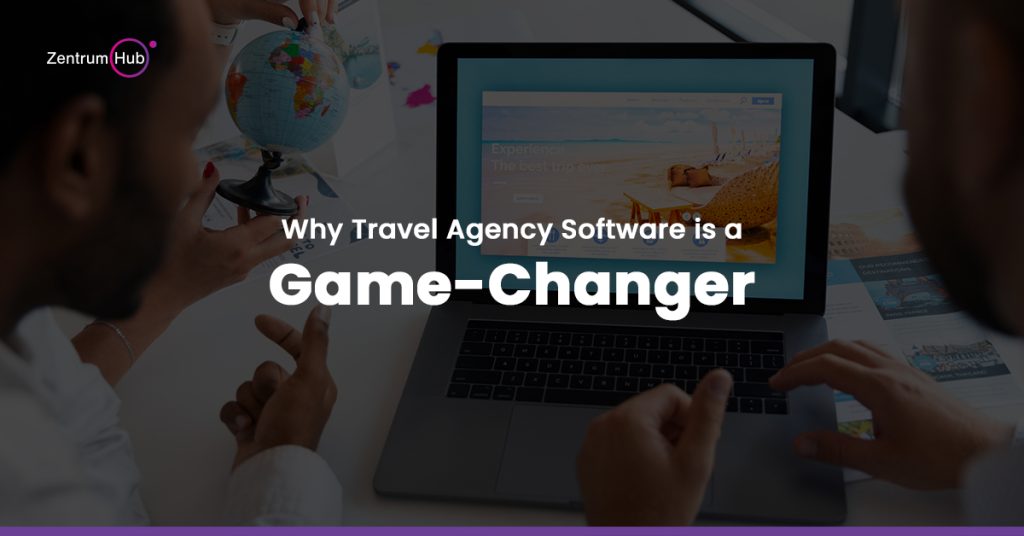
Why Travel Agency Software is a Game-Changer? Running a travel agency is more than just booking flights and hotel rooms. It’s about crafting memorable experiences, understanding clients’ unique needs, and bringing together the perfect blend of destinations, activities, and services. But behind every seamless trip lies a maze of logistical challenges: tracking bookings, managing itineraries, handling supplier communications, and keeping up with ever-evolving client expectations. The complexities can be overwhelming, especially in today’s fast-paced, technology-driven market. This is where travel agency software steps in, transforming the way agencies operate by automating key processes, consolidating data, and offering intuitive tools that enhance both customer experience and operational efficiency. With the right software, a small team can handle hundreds of clients, while a larger agency can deliver highly personalized service on a scale. This blog explores how travel agency software is revolutionizing the industry, from simplifying day-to-day operations to helping agencies grow. Whether you’re a boutique agency or a large firm, discover how this technology can help you manage your travel business with ease. The Evolution of Travel Agency Software Over the years, travel agency software has evolved from basic booking systems into comprehensive platforms that streamline nearly every aspect of a travel business. Initially, travel agencies relied on simple tools for managing bookings, collecting client data, and handling supplier communications. Today’s advanced software does far more, integrating with global distribution systems (GDS), offering real-time inventory, and providing powerful CRM capabilities. Key Developments in Travel Agency Software: Automation of Routine Tasks: Booking confirmations, invoicing, and customer follow-ups can be automated, saving valuable time. Cloud-Based Solutions: Most modern software is cloud-based, allowing for remote accessibility and seamless collaboration across teams and locations. Data-Driven Insights: Agencies now have access to analytics that track customer preferences, revenue streams, and operational efficiency. Mobile Compatibility: Mobile-friendly interfaces make it easier for agents to manage bookings and respond to customer inquiries on the go. These changes reflect a shift in the travel industry where personalization, real-time response, and operational efficiency have become key differentiators. Agencies that leverage advanced software gain a significant competitive advantage in meeting these demands. Benefits of Using Travel Agency Software Implementing travel agency software can provide numerous advantages. Here are the top ways in which it can improve both operations and client satisfaction: a) Improved Efficiency and Productivity By automating routine tasks like booking confirmations, client follow-ups, and payment reminders, travel agency software frees up time for agents to focus on higher-value activities. It reduces errors, streamlines workflows, and speeds up response times, all of which are essential in a fast-moving industry. b) Enhanced Customer Experience Today’s travelers expect personalized experiences and quick responses. With travel agency software, agents have instant access to client data, booking history, and preferences, enabling them to tailor their recommendations. This leads to higher client satisfaction and increased loyalty. c) Financial Management and Transparency Financial tools within travel software often include features for invoicing, expense tracking, and reporting, providing greater transparency. Agencies can easily monitor cash flow, manage payments, and generate detailed financial reports, which is crucial for maintaining profitability and planning future budgets. d) Real-time Access to Inventory and Rates Integrations with GDS and supplier networks mean that travel agency software provides real-time access to the availability and rates of flights, accommodations, tours, and other services. This enables agents to make accurate, up-to-date bookings, minimizing the risk of double bookings or pricing errors. e) Scalability for Business Growth Travel agency software grows with your business, allowing you to handle an increasing number of clients and bookings without overwhelming your team. Scalability is crucial as your agency expands, ensuring that you can manage larger workloads and more complex itineraries. f) Streamlined Supplier Management Managing relationships with multiple suppliers can be a challenge. Travel agency software consolidates supplier data and interactions, helping you track supplier performance, manage contracts, and streamline communications. Also Read How to Enhance Customer Experience with Travel Agency Software? Key Features to Look for in Travel Agency Software Choosing the right software requires an understanding of the features that will benefit your agency the most. Here are some essential features to look for when evaluating travel agency software: a) Centralized Customer Relationship Management (CRM) A CRM is the backbone of any successful travel agency. It allows agents to track client interactions, preferences, and booking histories in one place, making it easier to personalize the customer experience. A comprehensive CRM can also facilitate client segmentation for targeted marketing and loyalty programs. b) Booking Management System An efficient booking management system automates the booking process from start to finish, handling everything from reservations to confirmations and cancellations. It should ideally integrate with major travel suppliers and GDS to provide up-to-date availability and pricing. c) Itinerary Creation and Management A robust itinerary builder enables agents to create visually appealing, customized travel plans that can be shared digitally with clients. Some software platforms even allow clients to view their itinerary through a mobile app, ensuring they have all the details at their fingertips. d) Financial Management Tools Travel agency software should include invoicing, expense tracking, and payment processing features. Some platforms offer multi-currency support, essential for agencies dealing with international clients. Financial reports and analytics help agencies maintain budget control and forecast future expenses. e) Reporting and Analytics Detailed reporting and analytics tools can track booking trends, customer demographics, and financial performance. This data can help agencies optimize their offerings, tailor their marketing strategies, and make data-driven decisions to improve profitability. f) Marketing and Communication Tools Effective client communication is essential in the travel industry. Look for software that includes automated email campaigns, SMS notifications, and social media integrations, enabling you to keep clients informed at every stage of their journey. g) Mobile and Cloud-Based Accessibility Cloud-based solutions allow agents to work from anywhere and ensure that they have real-time access to client information and booking updates. Mobile-friendly software further enhances flexibility, enabling agents to manage bookings on the go. Also Read Integrating Payment Systems into Your Travel Agency
Role of Hotel Booking APIs in Hotel Booking Engine
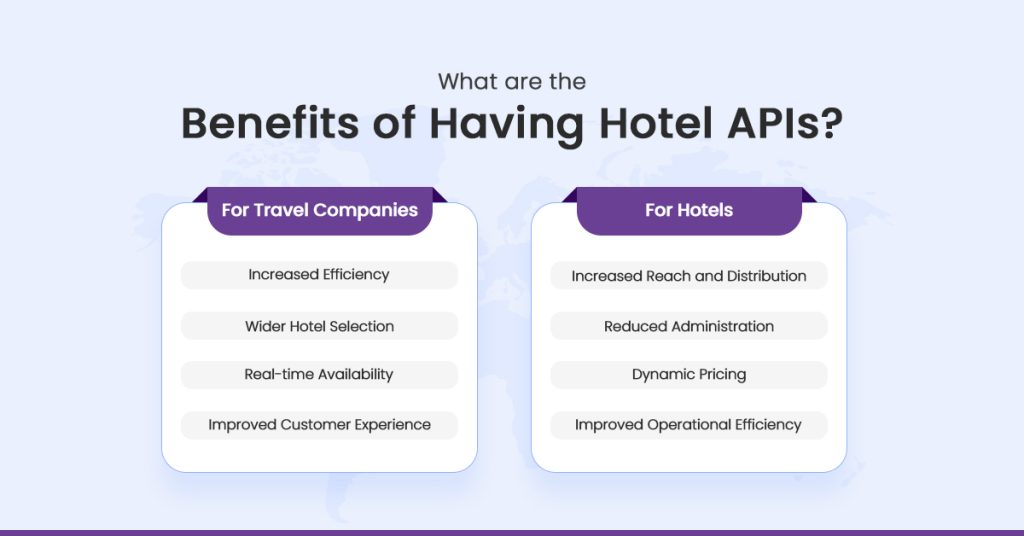
Role of Hotel Booking APIs in Hotel Booking Engine? Introduction What is a hotel booking API? How does the Hotel API work? What are the benefits of having Hotel APIs? How to choose suitable Hotel API? API and Beyond! ZentrumHub is Certified Hotel API Provider & Integration Partner for Hotel Suppliers.Integrated 60+ Hotel Suppliers across the Globe with Hotel Booking Engine! Introduction The travel industry has come a long way from its traditional ways. As the industry started adapting Hotel Booking APIs, it changed the game of online travel booking with highly capable and efficient systems such as OTA that made the whole process easier. As a result, productivity increased, along with customer satisfaction. A report from Statista states that by 2028, online sales will account for 82% of total revenue in the hotel market. Hotel APIs will be one of the significant reasons for this growth. If you are looking to enter the travel industry with your OTA platform, you must understand how a Hotel API system works and how it can help you take your business to the next level. This blog aims to inform you about hotel APIs and how they can revolutionize your online travel booking business. What is a hotel booking API? Simply put, a hotel booking API is a programming interface that connects online travel agencies to various suppliers to gain access to their hotel inventories to showcase on your online travel portal. The Hotel API primarily functions as a catalyst that provides real-time access to room availability, pricing, rich content and more. Travel businesses can leverage Hotel Booking APIs to provide customers with a vast selection of hotels and immediate booking confirmation, enhancing the customer experience. In addition, a Hotel API also helps to streamline the booking process, which mitigates any scope of human errors. However, integrating hotel APIs into travel agency software requires several technical processes, including room mapping, data processing, error handling, and conflict resolution. Thus, it is crucial to understand the API’s intricacies. How does the Hotel API work? Replacing the traditional mediators, the hotel connects to a global or local API, which then connects the hotel with other agency sites that provide a vast, constantly updated database. Here’s a simplified breakdown of how API works. Initiating an API request: The travel company initiates the process by sending a request to the hotel API, specifying search criteria like location, dates, room type, and desired amenities. API communicates with hotel reservation systems: The Hotel API acts as a bridge, communicating with the reservation systems of various hotels or chains based on the specified criteria. This process often involves industry-standard protocols and formats for data exchange. API receives and processes hotel data: The API gets responses from the hotel reservation systems, including details like room availability, rates, descriptions, and amenities. The API may then process and filter this data based on the travel company’s initial request. The API sends a response to the travel company containing relevant hotel information tailored to the search criteria. Travel company displays or utilizes the data: The travel company can then use the received data for various purposes, such as displaying hotel options on their website, allowing users to compare prices, or even facilitating the booking process directly through the API. In essence, hotel APIs streamline the process of accessing and utilizing hotel data for travel companies, enabling them to offer a broader range of hotels, real-time availability, and automated booking functionalities. What are the benefits of having Hotel APIs? Hotel APIs offer a range of advantages for both travel companies and hotels, making them a valuable tool in the hospitality industry. Here’s a closer look at some key benefits: For Travel Companies: Increased Efficiency: APIs automate searching and retrieving hotel data, eliminating the need for manual searches and data entry saving significant time and resources. Wider Hotel Selection: By connecting to multiple hotels and chains through a Single Hotel API, travel companies can offer their customers a wider range of accommodation options, catering to diverse needs and budgets. Real-time Availability: APIs provide access to real-time inventory and pricing information, ensuring customers get the most up-to-date options and preventing overbooking issues. Improved Customer Experience: Travel companies can enhance their customer experience and satisfaction by offering a wider selection, real-time information, and potentially streamlined booking directly through the API. For Hotels: Increased Reach and Distribution: APIs connect hotels to a broader network of travel companies, increasing their visibility and reaching potential customers across various platforms. Reduced Administration: Automating the data exchange process through APIs can reduce hotel administrative burden, freeing up staff time and resources for other tasks. Dynamic Pricing: APIs allow hotels to implement dynamic pricing strategies, adjusting rates based on factors like demand, seasonality, and competitor pricing, potentially increasing revenue. Improved Operational Efficiency: Integrating APIs with hotel management systems can streamline operations, improving inventory management and department communication. Hotel APIs offer a win-win situation for travel companies and hotels, fostering greater efficiency, wider reach, and a more dynamic and competitive hospitality landscape. How to choose suitable Hotel API? To ensure that you select a suitable Hotel for your business, it is necessary to consider the following options: Data Coverage: API offers may differ from one another. Thus, consider whether it offers access to a broader range or specific destination. Depending on your requirements, select the API that fits your needs. Quality of Data: As an OTA, showcasing rich content on your website becomes essential. Providing accurate and updated information ensures the reliability of your customers. Payment Model: The payment model is one of the primary considerations before buying any API. A few APIs have subscription-based models, while others charge based on the number of API calls made or the amount of data accessed. Easy Integration: The main factors here are choosing an API that provides clear documentation, developer tools, and quick support. However, sometimes integrating an API may take months; thus, selecting an API provider who can do this in minimal time with all the factors is a
Why does every OTA need travel agency software?
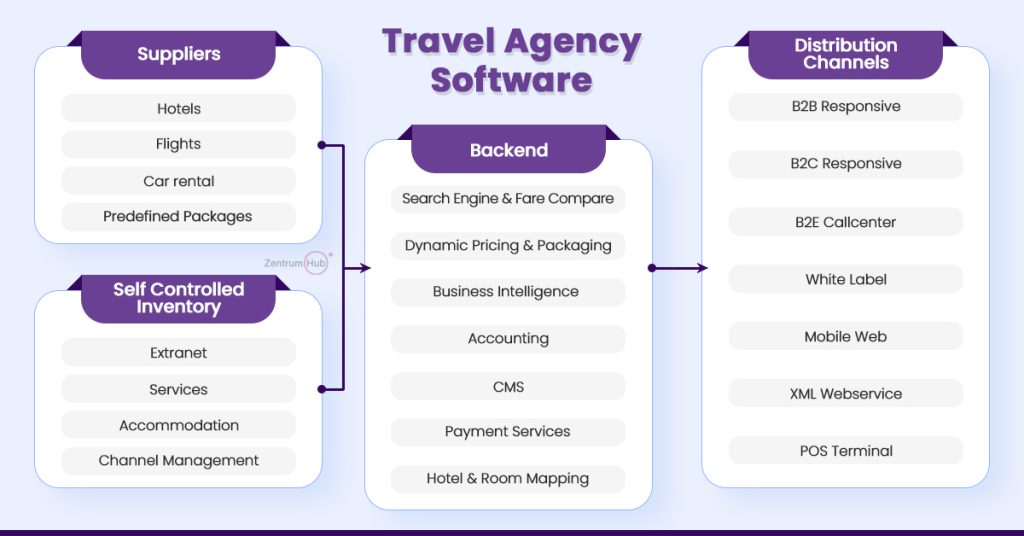
Why does every OTA need travel agency software? Introduction What is a travel agency software and what are the Major Components of it? How can travel agency software help you automate, analyze and attract? What are the modules of travel agency software? What are the modules of travel agency software? Staying Ahead of the Curve Can you imagine a world without online travel booking and mobile apps? Seems impossible, right? However, that was the case two decades ago. Ever since the travel industry has witnessed several changes, traditional travel agencies adapted to the modern methods of the digital age. It feels nostalgic as the days of handwritten itineraries and paper hotel confirmations are behind us; today, instant online bookings and mobile check-ins have replaced traditional methods. Swiping through travel apps and clicking online reviews has become the go-to approach for seeking popular tourist spots and experiencing new destinations. The shift to online travel and hospitality brings benefits like convenience, personalization, and wider choices. Today, Online Travel Agencies (OTAs) have become the forefront face of the industry, and to keep up with the growing demands and expectations of travelers, they must step up their game; that is where travel agency software comes into play. So, what does a travel agency software do? How can it help elevate your business to the next level? We will find all these answers in this blog. Let us dive in! What is a travel agency software and what are the major components of it? Travel agency software acts as a central hub, streamlining the management and automation of your travel business’s sales, bookings, refunds, back office and revenue management. As an OTA, it is essential to know what features of travel agency software you can leverage to upscale your business. We are listing some features below: Booking and Cancellation System: Today, almost every booking is carried out online. As an OTA, it becomes your priority to connect with Global Distribution Systems (GDS), and other hotel and activity suppliers, which will provide access to your end-users with the best deals. Here, travel agency software improves and speeds up the booking process, offering customers more options such as multi-language support, updated pricing, multiple payment options, auto confirmations and notifications. The booking system also allows you to track and manage all bookings in one place, ensuring accuracy and avoiding overbooking. OTAs can receive real-time updates on cancellations and modifications, which allows for proactive communication with customers. Accounting System: Integrating your platform with accounting software is essential. It covers online payment with secure SSL encryption, invoices for both partners and clients, detailed financial statements, sales commission calculations, and data analysis. Accounting systems integrated with various payment gateways to accept credit cards, debit cards, and online wallets streamline the booking process, helping end-users make a hassle-free payment quicker and enhancing their experience. Itinerary building can be a tedious and tricky task as there are too many factors to consider when planning a trip, such as means of transportation, hotels, and exciting events. If an OTA provides all this information in a detailed manner, it becomes much easier for customers to select a tour package that they specifically need. An itinerary software can help you create tour packages with the best touring options for the client’s budget and wish. These tours can be segmented into individual, group or corporate travel plans. A well-designed tour plan with plenty of good features also makes you stand out from other OTAs. Customer Relationship Management Systems are significant when collecting customer data and offering relevant services based on their segment. OTA can utilize this data to create discounted and promotional offers. CRM often provides saving and organizing customer data, segmentation of buyers and providers, and detailed reports on clients, partners, and tours. Additionally, it collects customer reviews, personalized offer development, loyalty programs, newsletters, and more. Access to crucial data unlocks fresh marketing opportunities. However, visibility is the key. Equipped with effective marketing tools, you can create targeted campaigns, manage social media presence, and build strong customer relationships, making advertising more effective and customers happier. Read More Integrating Payment Systems into Your Travel Agency Software How can travel agency software help you automate, analyze and attract? Depending on the different functionality, travel agency software can make your OTA more efficient. Most companies prefer ready-to-go solutions. However, you can also opt for tailored solutions as they give more customization options based on your needs. Below are a few options that you should consider: Business Expenses: Automation has become an integral part of the digital world. Utilizing travel agency software for registering requests and answering questions through chatbots eases the human efforts required for this minimal task. Automating these processes can free your team to focus on strategic marketing and improving customer services. Data Management: Cloud-based services allow OTAs to access data from sales reports, bookings, payments, and individual preferences, which can help you improve the operational process across different levels. By doing this, you can ensure that you are meeting the demands and expectations of consumers. Supplier Database: Whether you are a giant travel platform or SME, your OTA needs supplier databases, as they can help you expand your business in various geographic locations. Suppliers have numerous inventories, from large hotel chains to local lodges. You can access these inventories with the help of booking APIs. Client Management: Based on consumer behaviors, booking history, and transactions, you can easily create custom packages for frequent travelers, offering discounts. This data can also help you create loyalty programs that increase brand value, retain existing customers, and attract newer ones. Read Also How to Enhance Customer Experience with Travel Agency Software? What are the modules of travel agency software? What are the modules of travel agency software? Modules are the core functionalities of any travel agency software that offers you a comprehensive overview of the capabilities that are beneficial for online travel agencies. Below are a few modules of travel software. Hotel Contracting Module: This module allows OTAs to

